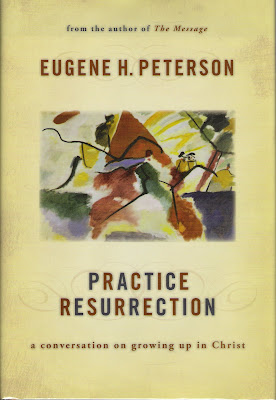Renovare: Pastoral Letter from Richard
Foster November 2005
Spiritual transformation and nonviolent action: interpreting Mahatma Gandhi
and Martin Luther King Jr. (Philip Hefner, Currents in Theology and
Missions 2004)
Spiritual Formation
(Joann Conn, Theology Today 1999)
Spiritual Formation (Richard Foster)
Christian Spiritual Formation (Richard Foster)
Is propositional revelation essential to Evangelical spiritual formation?
(Gordon Lewis, Journal of Evangelical Theological Society 2003)
The Wisdom tradition (Richard
Foster)
Thomas Merton's three epiphanies (Gary Commins,
Theology Today 1999)
Spiritual Formation Groups Common Disciplines
(Renovare)
Spiritual Formation
(Rowland Croucher)
Embracing Suffering (Richard Foster)
Transforming Discipleship:
Foundations of Christian Spiritual Formation (Richard Averbeck)
Descriptors of Spiritual Formation (TACT)
Spirituality and Spiritual Formation
(Richard Averbeck)
Lessons from 15 years of Renovare
(Richard Foster)
Education of the
Heart
(Cross Currents)
Spiritual Formation based Congregations I (Richard Foster)
Spiritual Formation based Congregations II
(Richard Foster)
Spiritual
Formation: What it is, ad how it is done (Dallas Willard)
Idaho
Springs Inquiries Concerning Spiritual Formation (Dallas Willard)
Spirituality for Smarties (Dallas Willard)
Spiritual
Formation in Christ: A Perspective on What it is and How it Might be Done
(Dallas Willard)
Spiritual
Formation: What it is, and How it is Done (Dallas Willard)
Spiritual
Disciplines, Spiritual Formation and the Restoration of the Soul (Dallas
Willard)
Why Spirituality Needs Jesus
(Eugene Peterson)
What is the Focus of Spiritual Life? (Scott McKnight)
Jesus as Lord, Jesus as Servant (Diogenes Allen)
How To Be a Disciple (Dallas Willard)
Orientation to
Spiritual Formation, with Special Reference to the New Testament
(Michael H. Burer)
Towards a Biblical
Definition of Spiritual Formation: Romans 12: 1-2 (Michael H. Burer)
Community:
Discovering Who We Are Together (Center for Christian Leadership, Dallas
Theological Seminary)
Interview: Richard
Foster on Spiritual Formation (Christianity Today Sept 2008)
Christian Formation in and for Sabbath Rest (Dorothy Bass, January
2005, Interpretation)
---------------------------------------------------------------------------------
Rediscovering Centeredness
 |
| ©Andris Piebalgs |
Dreamstime.com |
M. Scott Rogers discovered his centredness when reading Henri Nouwen's
The Genesee Diary.
I started a journal to pair with
reading this book. It’s the first such journal I have consistently
written in. What strikes me, is the fact that journaling is too a lost
practice among many Christians. Which has prompted me to find the reason
for disappearance of these disciplines. The only answer I can find is
the trend to become more free-spirited in our religious pursuits,
trading what benefits us for what feels better, what is more enticing.
The idea of prolong stretches of silence in a church service equates to
the unexpected interruption of a blockbuster movie at the theater. We
leave, we check out.
Moments of
silence, of stillness offer us the opportunity to reflect, to consider,
to digest what we’ve seen, heard, and emotionally felt.
Instead we tend towards the side of annoyance, disparaged by the halt in
“entertainment” which what so many evangelical churches have become. I
know they, the pastors and church staff, mean well. Still, how can I
really implement anything they teach if I don’t quiet myself long enough
to hear the expressed and implied meaning of the message?
read
more
-------------------------------------------------------------------------------------------
Evangelical Anxieties over Spiritual Formation
In the recent issue of
Journal of
Spiritual Formation & Soul Care, 2008, Vol. 1, No. 2, 129–148,
there is this interesting article.
Sanctification
in a New Key:
Relieving
Evangelical Anxieties Over Spiritual Formation
by Steve L. Porter
Rosemead School of Psychology and
Talbot School of Theology (Biola University)
Abstract: This article is meant to be an apologetic for spiritual
formation to those within the evangelical tradition who find
themselves concerned about its emphases. Eight common objections to
spiritual formation are presented with the twofold aim of
recognizing any needed corrective and defusing the objection. While
more must be said in response to each of these objections, it is
hoped that enough will be said here to relieve much of the anxiety
surrounding spiritual formation.
The eight general objections to spiritual formation from
evangelicals are:
(1) Spiritual formation is just a fad
(2) Spiritual formation is Catholic
(3) Spiritual formation is New Age
(4) Spiritual formation is contrary to the sufficiency of Scripture
(5) What ever happened to old-fashioned obedience?
(6) Spiritual formation encourages works righteousness
(7) Spiritual formation is overly experiential
(8) Spiritual formation neglects mission/evangelism
Steve Porter addresses each one of these objections systematically,
showing that Christians especially Evangelicals have nothing to fear
from spiritual formation. In fact, spiritual formation as
sanctification is very biblical. I am glad that someone has finally
written an apologetic for spiritual formation.
In my teaching and researching of spiritual formation, I continually
meet the same objections from some pastors and church leaders. Even
today, I am on the blacklist of certain pastors and church leaders
because of my association with spiritual formation.
Download the article
here
-------------------------------------------------------------------------------------------------------------------------
Blind Spot of the Spiritual Formation Movement
The Blind Spot of
the Spiritual Formation Movement
Listening to a sermon is a spiritual discipline that needs to
be learned.
Craig Brian Larson
Craig Brian Larson is editor of PreachingToday.com and pastor of Lake
Shore Church in Chicago. He is co-author and co-general editor of
The Art & Craft of Biblical Preaching (Zondervan, 2006).
Craig Larson identifies the spiritual discipline of listening to sermons
as a blind spot of the spiritual formation movement. Read
more
I want to say that sound biblical
preaching does the following nine things that individual Bible reading,
memorization, and meditation does not:
(1)Good preaching rescues us from our self-deceptions and blind spots,
for left to ourselves we tend to ignore the very things in God's Word
that we most need to see. Preaching is done in community, covering texts
and topics outside of our control.
(2)Preaching brings us before God's Word in the special presence of the
Holy Spirit, who indwells the gathered church.
(3)Good preaching challenges us to do things we otherwise would not and
gives us the will to do them. God has put within human nature a
remarkable power to spur others to take action.
(4)Good preaching brings us into the place of corporate obedience rather
than merely individual obedience. This is a uniquely corporate
discipline that the church does together as a community, building up
individuals and the community at the same time. We are not just an
individual follower of Christ; we are a member of his church and are
called to obey the call of God together with others hearing the same
Word.
(5)Good preaching contributes to spiritual humility by disciplining us
to sit under the teaching, correction, and exhortation of another human.
Relying on ourselves alone for food from the Word can lead to a spirit
of arrogance and spiritual independence.
(6)Good preaching gives a place for a spiritually qualified person to
protect believers from dangerous error. The apostles repeatedly warned
that untrained and unstable Christians—as well as mature believers—are
frequently led astray by false doctrines. Christians are sheep; false
teachers are wolves; preachers are guardian shepherds. A preacher is a
person called and gifted by God with spiritual authority for the care of
souls in the context of God's church.
(7)Preaching and listening is a uniquely embodied, physical act. It
literally puts us into the habit of having "ears that hear." There is
something to be said for this physical act of listening and heeding.
Good preaching is truth incarnated, truth mediated through a person from
its ancient setting to today, truth we can feel through another person's
heart, truth conveyed through an embodied person, truth we receive
sitting shoulder to shoulder with other embodied Christians.
(8)Good preaching does what most Christians are not gifted, trained, or
time-endowed to do: interpret a text in context, distill the theological
truths that are universally true, and apply those truths in a particular
time and place to particular people in a particular church—all this with
the help of resources informed by 2,000 years of the Church's study that
average Christians do not own. This is a challenging task for
well-trained preachers; how much more so for those untrained?
(9)Listening to preaching has a much lower threshold of difficulty for
almost all people. While many spiritual disciplines sound like exercises
for the spiritually elite, both young and old, educated and uneducated,
disciplined and undisciplined can at least listen to a sermon. It is
God's equal-opportunity discipline. Preaching and listening is
everywhere in the Bible because it is doable by the masses.
----------------------------------------------------------------------------------------------------------------------------
Christianity Today, January, 2009
Three priorities for the next 30 years.
Richard Foster | posted 2/04/2009
08:48AM
Thirty years ago, when
Celebration of Discipline was first penned, we were faced with two huge
tasks: First, we needed to revive the great conversation about the formation
of the soul; and second, we needed to incarnate this reality into the daily
experience of individual, congregational, and cultural life. Frankly, we
have had much greater success with the first task. Christians of all sorts
now know about the need for spiritual formation, and look to saints
Catholic, Orthodox, and Protestant for guidance.
It's the second task that
needs to consume the bulk of our energies for the next 30 years. If we do
not make real progress on these fronts, all our efforts will dry up and blow
away.
read
more
------------------------------------------------------------------------------
Eugene Peterson on Spiritual Theology
I always regard Eugene
Peterson as one of the modern masters of spiritual theology. I am sure he
does not think of himself that way. He was one of the few early Evangelicals
who was into spiritual theology before it became popular. He is the
Professor Emeritus of Spiritual Theology of Regent College, Vancouver,
Canada. His earlier books are still worth reading. These five books of a
conversation on spiritual theology together are Eugene Peterson's magnum
opus on the subject.

2005
Jesus is God incarnate, a God who is immanent and transcendent. In this
book, Peterson shows an immanent Christ that is present in us all and in
creation. This forms the framework for the rest of the books on
spiritual theology

2006
The book is about the Bible and how we as Christians are to understand
the truths that are in it. Peterson, the author of The Message which is
a modern paraphrase and translation of the Bible is in a unique position
to show us what teaching and learning from the Word of God is about. He
challenges us from mere cognitive understanding to propositional truths
to assimilating and living it out the Bible - hence eat the book.

2007
How we do as disciples of Jesus Christ behave and live in this world is
the subject of this book.

2008
Languages are important media of communications. In this book, Peterson
takes on the way we understand truth and how our culture limits our
understanding. Peterson shows us the way Jesus uses languages to teach
his disciples.

2010
This is the final book in the series. Peterson wraps up his discourse on
spiritual theology by exploring what spiritual growth or spiritual
formation involves.
-----------------------------------------------------
The Jesus Prayer (Frederica
Matheves-Green, Kyria 2010)
----------------------------------------------------
Dallas Willard's Sense of Ministry
I find this comment by Dallas Willard on
his homepage of his
website very relevant.
My sense of ministry
is to judge the lay of the land for
your times and shoot where the enemy
is. The enemy in our time is not
human capacity, or over activism,
but the enemy is passivity - the
idea that God has done everything
and you are essentially left to be a
consumer of the grace of God, so the
only thing you have to do is find
out how to do that and do it
regularly. I think this is a
terrible mistake and accounts for
the withdrawal of active Christians
from so many areas of life where
they should be present. It also
accounts for the lack of spiritual
growth, for you can be sure that if
you do not act in an advised fashion
consistently and resolutely you will
not grow spiritually.
There is a great collection of his
articles and recordings on
Dallas Willard's website and on
spiritual formation
------------------------------------------------------------------------
evangelical piety turns upside down the medieval paradigm of a pathway to God. There the journey of faith began with purgation, moved to illumination, and finally, ended in unification, that is, union with God. In the evangelical understanding, we begin with union with Christ (the new birth) and move through Word and Spirit to illumination and the process of sanctification until, at last, in heaven we see Christ face to face
Timothy George
For All The Saints: Evangelical Theology and Christian Spirituality,
p.4
------------------------------------------------------







